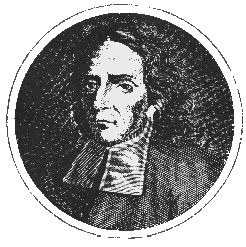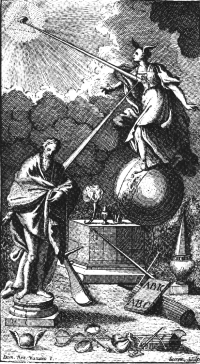

For Giambattista Vico (1670-1744), the Neoplatonic Art of Memory of Giulio Camillo and Giordano Bruno, was a means at gaining access to the lost origins of human creation rather than some transcendental state. It was the wisdom of poetry, rather than philosophy, which the ancients possessed according to Vico. The ancient oral poets had discovered the power of understanding and acting, which was historical rather than cosmological in Vico's vision of the world.
Vico developed a theory of the origins of human consciousness based upon the three Egyptian periods for nations:
(1) The age of the gods, in which the gentiles believed they lived under divine governments, and everything was commanded them by auspices and oracles, which are the oldest institutions in profane history. (2) The age of the heroes, in which they reigned everywhere in aristocratic commonwealths, on account of certain superiority of nature which they held themselves to have over the plebes. (3) The age of men, in which all men recognized themselves as equal in human nature, and therefore there were established first the popular commonwealths and the monarchies, both of which are forms of human government [1].
Each age had its own kind of arts, skills, laws, and government. All human endeavor was based in the use of language and this use indicated the age at which the society was in: (1) The hieroglyphic or sacred or secret language, by means of mute acts... (2) The symbolic, by means of similitudes... (3) The epistolary or vulgar, which served the common uses of life [2]
Another twist on this fundamental scheme of Vico's theory, was that these ages were cyclical: after the third age, a recorso, a period of undefined chaos occurred which would reset everything back to the age of gods. It was also Vico's belief therefore, that all human activities, institutions, governments, and civilizations, etc. were destined to progress through these three ages, and ultimately end in oblivion. A somewhat cynical and existential view for the 18th century.
In Vico's history of the emergence of thought, human consciousness begins with fear as a response to a loud noise, with thunder being a prime example as being perceived as the Voice of God. It is fear which makes the link between emotion and external stimulus that is at the bases of sensus communis, the 'common sense' known to all humanity. This is at the most archaic level of human understanding, based in the most original and primitive forms of speech as exclamatory yelps and shouts of emotion, within a layer of thought which is not logically derived and is non-rational like that of the animals.
Above this layer, is the layer of topics. Topics is the art of making the connecting logical link between two observable propositions. Poetic wisdom is the next layer above this, and it begins with a theory of topics as being the poetic formulae through which people identify the phenomena of the world. The link between two initial syllogisms, are self-coherent elements of thought. They provide fixed points of reference and a map upon which the flux of experience can be transposed and quantified.
These puncta metaphysica or 'metaphysical points'
constituted a structure for the perception of reality, as the link between
topics allowing for the connection to other links. They are points in memory,
and could be likened to the stones and tidal pools left behind a crashing ocean
wave (like raw experience) on a beach.
 As they multiply, the topics are abbreviated and are
represented by metaphor: a particular image in the mind that is chosen to
represent and remember a topic by.
As they multiply, the topics are abbreviated and are
represented by metaphor: a particular image in the mind that is chosen to
represent and remember a topic by.
Vico believed that the most ancient people thought in metaphor. As the knowledge of topics became more extensive, Vico understood metaphor as being continuously refined and transformed into three rhetorical figures befitting the three ages of civilizations: (1) metonymy, a vivid image of detail representing the complete expression of the topic, (2) synecdoche, an image that conveys just the character or 'look and feel' of a topic, (3) irony, were an image has acquired a meaning and a point of reference of its own, and has lost the connection between the originating topic. With irony, the process can start over, with new links between the newly isolated propositions. Vico's new science therefore is based in the conception of consciousness as a process of abstraction, which separates by forgetfulness, human thought from actual physical perceptions. It eventually places all human discourse adrift in a sea of ironic images, that are constantly and automatically refining and recompartmentalizing themselves into exhaustion as they approach the entropic heat death of a recorso -- in this instance a kind of cancer of the imagination.
Modern 18th century language and human discourse for Vico, had lost its connection with the imaginative poetic processes that originally formed it. Image and idea had become separated and unsynchronized. Vico foresaw the growth of the printed word, as increasing this separation by the profuse publication of 'unworthy' texts which no longer needed the vocal explanation of the rhetorician. Contact to the poetic code could be regained Vico believed by the historical reconstructions of the origins of language. History was therefore viewed by him and successors to his theories, as a set of images encoded upon the events of time, whose contemplation allowed one to recover forgotten and suppressed earlier forms of feral imaginative thinking. The quest for the origins of imaginative thought eventually became the primary goal of the Romantic poets and philosophers of the nineteenth century and was the heart of the early psychoanalytical theories of the twentieth century.
References:
1. The New Science of Giambattista Vico, unabridged translation of the Third Edition (1744), translated by Thomas Goddard Bergin and Max Harold Fisch (Ithaca and London: Cornell University Press, 1991), para. 31.
2. Ibid, para. 32.
For further information there is also a Giambattista Vico home page.